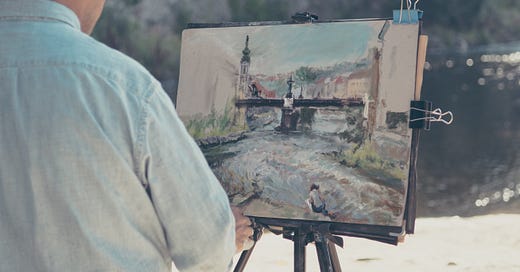Why Create?
Because it is right. Because you don’t know who you might be inspiring. Because you don’t know whose libation the gods will receive. Because comrades share everything.
When you have offered
your libation and have prayed, as is right,
hand your comrade the cup of honey wine,
so he may pour out his libation, too,
for he looks like someone who offers prayers
to the immortals.All men need the gods
Homer
I was discussing this (above) part of The Odyssey with a friend and although I loved the lines, I had not deeply considered its meaning. This brings me to my first thought: conversation and discussion force you to drive beyond the surface to suck the juices out of texts and concepts and ideas. This may be done spontaneously or in a more regulated fashion; the key is to be sincere and open to what the text has to say rather than twist it to do your bidding.
But here is what I got from Homer’s poem: that it is good to share and have in common, things you have deemed virtuous with others. And this is by no means a new saying because we all know that it is good to share. But I want you to consider the imagery. For libations and prayers are good. But what is the purpose of handing the cup of honey wine to the comrade, especially when you could have simply offered libations on his behalf (like Phaedrus asked Socrates “Let me also share in this prayer; for friends have all things in common”)? Why is it good for your comrade to pour out his libations too?
Well, the answer, I believe, is something close to what I mentioned in a certain essay where I mentioned that “I know I have read something valuable when, rather than merely being grateful that my questions are answered, I am inspired to be creative and valuable.” This is to say that a creative act is successful when it inspires others to create also. This is how I measure myself too: the things I write are successful if they give you something to think about or if they give you a fresh perspective with which to think about something. You may also interpret this as the idea that the joy of observing a work of art is no match for the joy of creating something yourself. To refuse to give your comrade the honey wine cup to pour his libations is to rob him of the superior joy.
For so many people, observing a piece of creation invokes momentary awe and gratitude. They listen to Mozart and have goosebumps; some see Michael Jackson and they faint; read Neil Gaiman and are spellbound. All these are good. But very often, it should not be the end. Now I am all for enjoying things as ends in themselves (as opposed to utilitarian optimisation) but if observing and enjoying pieces of creation satisfies our aesthetic senses, and gives us things in common with others, we have a burden to keep creating virtuous things that improve the resource pool we have in common. We have a burden to pay it forward.
What do I mean? First, we must acknowledge that the things which have no clear utilitarian purposes (that is, things whose worth is measured only in economic terms) provide materials for leisure, conversation, and culture. This is to say that artworks—be they books, music, films, paintings, or sculpture—give us things to discuss and enjoy in lighthearted, restful moments with friends and family. I built a friendship with a work colleague over Marvel Cinematic Universe. If they serve this end for leisure, it behoves us to do things that allow the multiplication of virtuous things.
To use the example from Simon Sarris’ In Praise of The Gods:
“Almost no new cities match the beauty of the few remaining medieval city centres, which themselves are so cherished that people will spend thousands to fly there, just to see them in person for a few days. But tourists fly home, and never think of creating a new place, of creating something that constitutes an artistic endeavour beyond themselves.”
The reason we hand our comrades the cup for libation is that we are entrusting them with the resources to offer libations; that is, to perform things that endure, immortal acts, and things which may, in turn, inspire others. It is giving them a chance to fulfil an innate desire to “offer prayers to immortals.” It is giving others a chance to create something out of their innate creative tendencies. To be content always then with momentary awe without any desire to create something that others might reap from—that is without paying it forward—is a subtle selfishness that robs your comrade of an opportunity to pour out his libation to the gods.
When people travel long distances to visit historical centres to enjoy things that served as a site of creative virtue for the people who lived at that time to gather and work and play together, but which are so absent today in our various cities and locations for one reason or another, they are content with departing without a thought flashing through their minds that they should pay it forward. It never occurs to them that it is good to obtain a common virtue for others within their locale. They may have experienced awe at visiting the Cologne Cathedral. But they lack any conviction that makes it possible to pay it forward.
Learning that these cathedrals take years to build—Cologne Cathedral took 632 years to build— highlights the importance of conviction. Only conviction can make men put their hands to start things they knew they will never complete in their lifetime. Only conviction lets someone commit to a project that started before he was born only sharing in the delight of its envisioned glory. Without conviction, you will either not create at all, or you will create things that pass quickly such that it does not allow anyone else in on a libation—because there was no libation to start with.
Why create? Because it is right. Because you don’t know who you might be inspiring. Because you don’t know whose libation the gods will receive. Because comrades share everything.
May we find conviction again.
And here is a meme on paying forward.
Subscribe to LIAM. This is my way of creating a common virtue. Thanks







